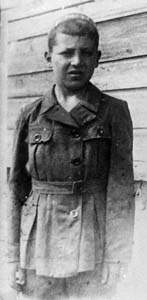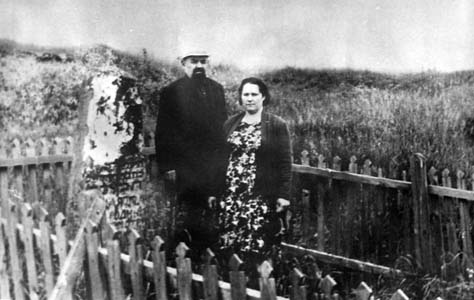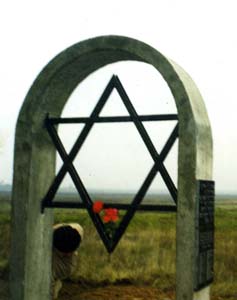

Project «Voices of Jewish settlements. Vitebsk region.»פיתוח קשרי התרבות בין העמים של ישראל ובלרוס
|
|---|
Website search |
|
MainNew publicationsContactsSite mapVitebsk regionMogilev regionMinsk regionArkady Shulman
|
A DAWN THAT TURNED INTO STONENovember 18th, 1941 was a tragic date for Sirotino. On this day its 316 Jewish residents were executed by Nazis. Lazar Massarsky at the age of 10.
Lazar Massarsky at the age of 10.Shot on November 18th, 1941. It was a cold May of 1941. The spring was already there but a northerly wind was still blowing, stealing all the warmth. It took over the streets and alleys in Sirotino and knocked at all the doors and windows. Lazar became a sixth grade student. His exams were over and ahead of him was a summer – a wonderful time for every teenager, when one can play with a ball, go fishing and flow kites. Lazar was especially keen on kiting. Lazar did not much even pay attention to the cold wind – he just needed to put on warmer clothes and the problem was solved. The first month of the summer also turned out to be chilly but the teenagers did not care what the weather was like. And then, as soon as it became warmer and the real summer set in, nobody noticed it. “The war!” – shouted the loudspeakers. “The war!” – wailed the women. Fear settled in people’s hearts. Life in Sirotino stopped in expectations of something horrible. As soon as people heard that the German Army had already reached Polotsk, crowds of refugees began travelling towards Gorodok – it was easier to reach Smolensk from there. Everyone thought Smolensk was safe – a lot of enemies had been defeated in the stone walls of the ancient town. Not everyone made a decision to leave – the Massarsky family, for instance, was among those, who decided to stay in Sirotino. Lazar, like most teenagers, was not particularly worried: the war was for adults, not for him. But after the town had been bombed by German planes – everyone realized the war would be merciless. Then the Germans invaded Sirotino – one could hear the crackling sounds of motorcycles and foreign speech everywhere. The new authority declared a new order. Sirotino was headed by a German commandant Spiegel. Soon he assembled the first police detachment, made up of 22 local residents. How did these people start hating the Soviet authority so strongly? - Some people had been deprived of their land, some had been sent to Siberia, some to camps, - recalls Lidia Stepanovna Suhanova. – But there was no such reason that could justify the murders. Danila Borovikov became the head of the police detachment. Before the war he had been in prison…  Ruvim Lazarevich Massarsky with his wife Nadezhda Mikhailovna,
Ruvim Lazarevich Massarsky with his wife Nadezhda Mikhailovna,at the place of execution of his relatives in Sirotino. The memorial was set up in 1957. In November, 1941 a census of the Jewish population was held and then there were rumors that Jews would be exiled. Those, who had relatives or friends in remote villages, began leaving the place secretly. But they were not many. In the middle of November a group of Jews, about 100 people, was brought to Sirotino from Obol and settled in Zarechie. The locals became worried again: “the Nazis are planning something bad!” The morning of November 18th was frosty. It was almost dawn when the Jewish residents were forcefully driven out of their houses and formed into a column. The people were asking the policemen: “Where are you taking us?” – “To a meeting, - they replied, - to Pligovki village.” “But we can hold a meeting here”, - said the astonished people. “Where? Outside here? In the frost? – they said – In Pligovki they have big barns. There are 300 of you here!” The people were then made to walk towards Pligovki. “Something is wrong here, - the people said. – there are no barns in Pligovki.” Danila Borovikov was at the head of the column. Lazar was in the middle of the column with his mother. A girl named Bela was walking next to them with her relatives. She was eight. “Mom, where are they taking us?” – she was crying because she was sleepy. Her mother tried to calm her down and said they were going to a meeting. Lazar became impatient, too. “When will this meeting start? I am cold!” His mother, a young woman of about 30 also tried to reassure him not to worry, hiding the tears in her eyes. But the boy noticed it and asked: “Why are you crying?” – “I am not crying, son, this is the frost,” – she hugged him. A young policeman Lesha, who was walking next to them, ran to his head and inquired: “Are we really taking them to a meeting?” Danila grinned and threw away his cigarette. “Sure. We will gather them and elect a presidium with Death at the head. Death will hold the meeting, - Danila laughed loudly and yelled at him – “you keep walking and looking after the column. Don’t ask me questions!” An old woman, Hana-Reiza, who was also at the head of the column, stopped when they climbed a hill and she saw piles of fresh ground, which had been dug out. She screamed: “People! We are being taken to a ditch! Run, everyone!”  The memorial in Sirotino
The memorial in Sirotinowas set up by Mikhail Naumovich Rutkin. The memorial was designed by Boris Yakovlevich Hesin and set up in 1998. The column broke and people dashed in different directions. But then the policemen started shooting and they came back into the column. Two policemen took Hana-Reiza’s body to the roadside. Meanwhile, a German car arrived and armed Germans started coming out. … The huge black ditch looked like it was breathing. People still could not believe they would be shot. They were still hoping… “Mom, take me into your arms,” – Bela began crying. Her mother strictly hushed her and thought silently: “You are not tall enough. Maybe the bullets will miss you…” Lazar stared at the ditch, refusing to understand anything. …The fire hit abruptly. The deathly fire lasted a moment. “What is happening to me? – Lazar wanted to scream but everything around him seemed to have turned into stone: the dawn with its sun, the trees, the fields and the clouds. It was impossible to move, even make a step, in this stone dawn. Lazar looked into the dawn’s stone eyes and there, far in the sky, he spotted a kite, which was flying away. The Germans left. Danila Borovikov was complaining: “This is not fair – they shot and we have to do the rest of the job.” Then he anglily ordered his subordinates to fill the grave up. Suddenly they saw something moving in the corner of the grave. Bela crawled from under the dead bodies and, crying, begged them to let her go and hide in the forest. “Sure, I will let you hide, - muttered Danila with anger, - let me just take my gloves off.” He took a spade and lifted it high above the girl’s head… On that morning only one Jew was not shot – a woman called Riabiniha. She was in Shumilino at that time. - Who was she, Riabiniha? – I inquired. - I do not really know. It was her nickname. As soon as she heard about the execution she came to the ditch. Next to the ditch she saw a boulder. She lay on it and said: “I want to die here.” People brought her clothes and food but she would not get up. She died there of grief. All her relatives were lying in the grave next to her. The spot, where Hana-Reiza was shot, was named after her. The old people know this spot… 65 years have passed since the tragic day. Not so long ago I was in Vitebsk archives and found out that before the war the head of the synagogue community in Shumilino was David Rabinovich. This is where the nickname Riabiniha came from – she was David’s wife… Anton Paraskevin,
|
|||
|
|
Jewish settlements in Vitebsk regionVitebsk • Albrehtovo • Babinovichi • Baran • Bayevo • Begoml • Beshenkovichi • Bocheikovo • Bogushevsk • Borkovichi • Braslav • Bychiha • Chashniki • Disna • Dobromysli • Dokshitsy • Druya • Dubrovno • Glubokoye • Gorodok • Kamen • Kohanovo • Kolyshki • Kopys • Krasnopolie • Kublichi • Lepel • Liady • Liozno • Lukoml • Luzhki • Lyntupy • Miory • Obol • Oboltsy • Orsha • Osintorf • Ostrovno • Parafianovo • Plissa • Polotsk • Prozorki • Senno • Sharkovshina • Shumilino • Sirotino • Slaveni• Smolyany • Surazh • Tolochin • Ulla • Verhnedvinsk • Vidzy • Volyntsy • Yanovichi • Yezerishe • Zhary • Ziabki • |
Main |
New publications |
Contacts |
Site map |
Vitebsk region |
Mogilev region |
Minsk region |